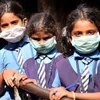Unseen impact of COVID-19 pandemic: children without care and protection
Shivani Bhaskar, Manager, Policy & Advocacy (Protection), Save The Children India, talks about protecting children from social impacts of the pandemic.
Today the world is facing an unprecedented challenge in the form of COVID-19. The pandemic has claimed more lives than any other event after the World War II. As per official figures[1] globally, more than 157 million people have so far been infected with Covid-19 with over 3.28 million lives lost.
Measuring the impact of COVID-19
It has been widely acknowledged that due to inadequate testing, especially in developing countries, the actual numbers could be much higher. In India, over 2,50,000[2] lives have been lost to the pandemic until mid-May 2021. As per the Ministry of Health & Family Welfare, almost 88 percent of the lives lost are in the age group of 45 or above.
The gravity of the situation could be understood with the fact that one life is being lost to COVID-19 every 20 seconds these days. The fatality in children is comparatively very low, at about 8.5 percent of reported cases, under 18 years of age with relatively few deaths compared to other age groups and usually mild symptoms, according to WHO. This means that while breadwinners are losing their lives, children are often left without one or both parents.
Fallout on children
As is with any other natural disaster or pandemic, the children are disproportionately affected by the pandemic. It has resulted in increase in poverty, internal migration, closure of schools, and loss of livelihood for millions. All these have impacted children on multiple fronts including their education, health and nutrition, and safety and emotional wellbeing. In India, children constitute 39 percent of the population, and they are facing these risks due to COVID-19.
As a consequence of this health crisis, children are bearing the brunt of poor diet, mental health challenges, social isolation, addiction to screens and lack of schooling & care, depending on different economic profiles they come from; with higher severity observed particularly among vulnerable groups.
What’s coming?
According to the the Principal Scientific Adviser to the Government of India, a third wave of the pandemic, much bigger in proportion to the first and the current wave, is likely to hit India in the near future. Considering the scale of the pandemic, the system is likely to be overwhelmed and likely to take away the focus from issues impacting children altogether.
A crisis requiring utmost attention of both the public and the authorities is that many children have lost their parents or guardian to the pandemic and are without care. There are cases where one parent has passed away while the other is sick or hospitalised, leaving children without any protection.
There is no information available on children who are living without parents’ or guardians’ support temporarily, and children who have lost their parent or guardian. Many fake numbers and messages are being circulated online in social media seeking to get information on such children. This, if not handled immediately, could lead to increased incidents of child trafficking or illegal adoption.
Regulatory approach to childcare
As per JJ Act 2015, any orphaned child under the age of 18 can be declared legally free for adoption who is without biological or adoptive parents or legal guardian; or whose legal guardian is not willing to take, or capable of taking care of the child. As per the Act, even the child’s relatives such as paternal/maternal uncle or aunt, paternal/ maternal grandparents need to legally adopt the child, once the CWC declares the Child as “legally free” for adoption.
In our response to extend help, we must be empathetic, thoughtful and in no way should end up causing more harm than benefit. Correct knowledge of rules and procedures is of utmost importance.
As per Section 31 of the JJ Act, any child in the need of care and protection, like those who have lost both parents, is to be produced before the District Child Welfare Committee (CWC) within 24 hours. Information about such children could also be shard on Childline 1098 or to NCPCR helpline 011-23478250.
The government on its part has taken a slew of measures to address the issue of orphaned children. Minister for Women and Child Development, Smriti Irani, informed that the GOI has reached out to all States to ensure their protection under Juvenile Justice Act, and has appealed to States to enable District Child Welfare Committees to actively monitor well-being of children in need.
The National Commission for Protection of Child Rights, Delhi Commission for Protection of Child rights and The Juvenile Justice Committee of the Supreme Court are taking steps to ensure care and protection to vulnerable children due to loss of one or both parents owing to the pandemic.
Need for Effective Emergency Response
Appeals and directions notwithstanding, this issue can only be addressed through concrete steps by the government and all other agencies.
The need of the hour though, is public awareness through mass and social media campaigns regarding the correct process to be followed for the adoption of any child, and the legal provisions against any illegal adoption. While the Childline helpline has been addressing problems faced by children, it would help if the service is strengthened further to manage increased calls relating to orphaned children.
Maintaining a database of such issues, identifying and tracking actions taken for affected children will add efficiency and predictability to the initiatives. Individual, family and community sponsorship must be rolled out immediately for COVID affected children and their families.
There is also a need to allocate funds under ICPS (Mission Vatsalya) for the welfare of affected children. State governments should ensure continuity of education for such children.
The authorities should organise health camps and ensure vaccination of all eligible persons who come in direct contact with children at Children’s Homes and After Care Homes. There is also a need to create temporary care shelters for children whose parents are suffering from Covid-19, and who need care and protection during such period.
In these difficult times when authorities in every department are overburdened with the task of handling the onslaught of the COVID-19 pandemic, we must not lose sight of the issues impacting the children. While the pandemic will eventually relent, urgent action for children by authorities, CSOs and public at large would help save the children from illegal adoption and trafficking, that can otherwise negatively impact their lives forever.
Edited by Anju Narayanan
(Disclaimer: The views and opinions expressed in this article are those of the author and do not necessarily reflect the views of YourStory.)







